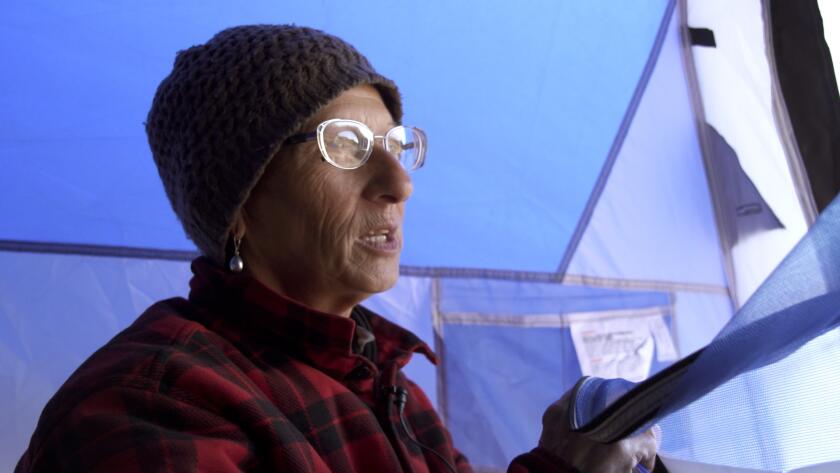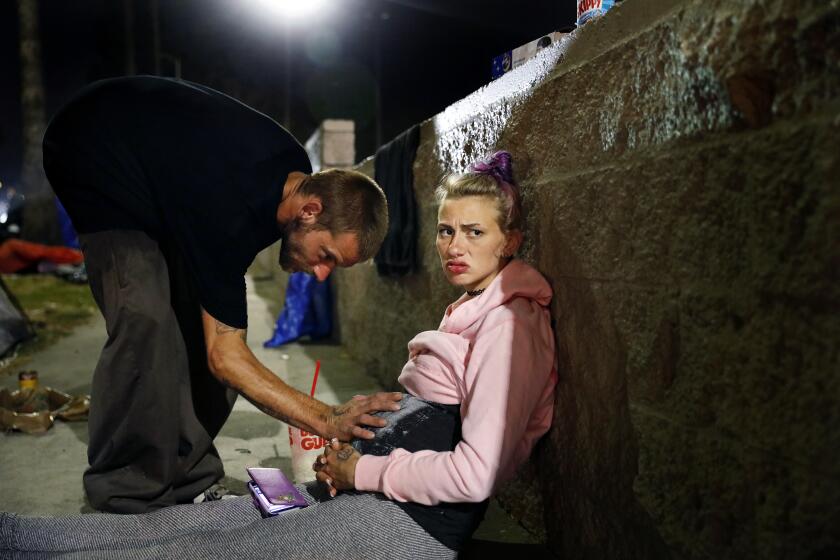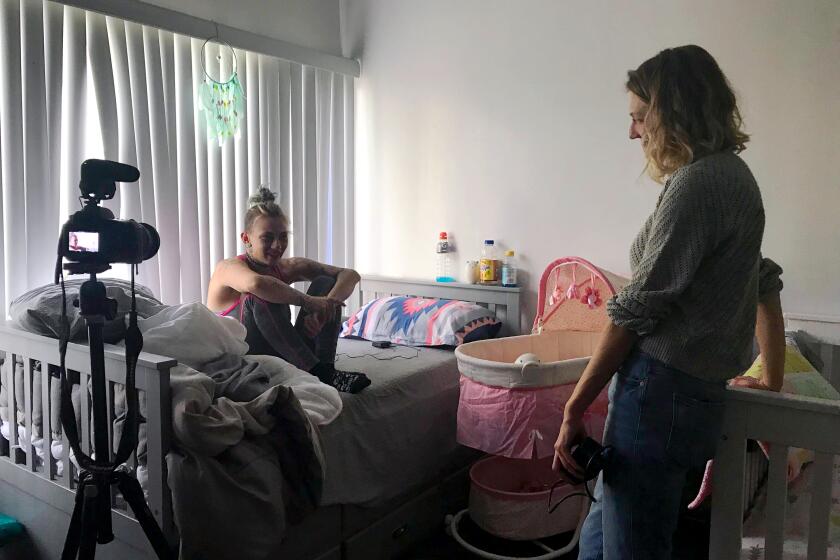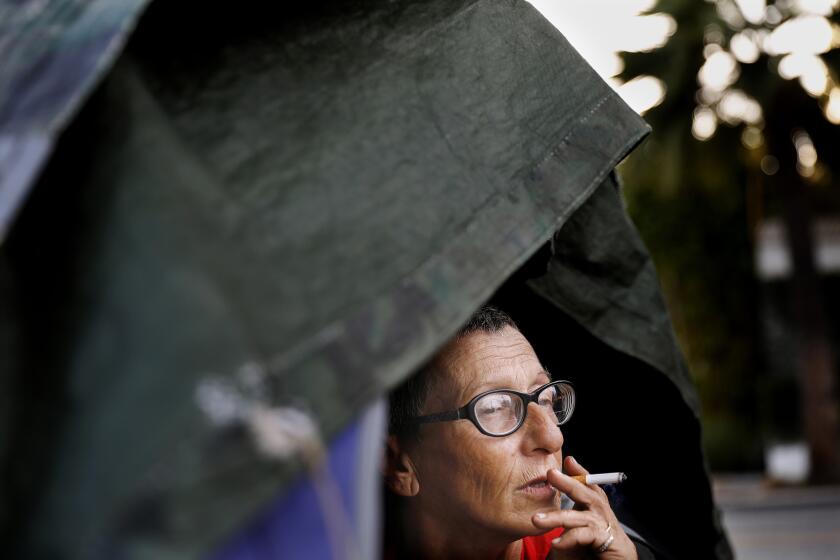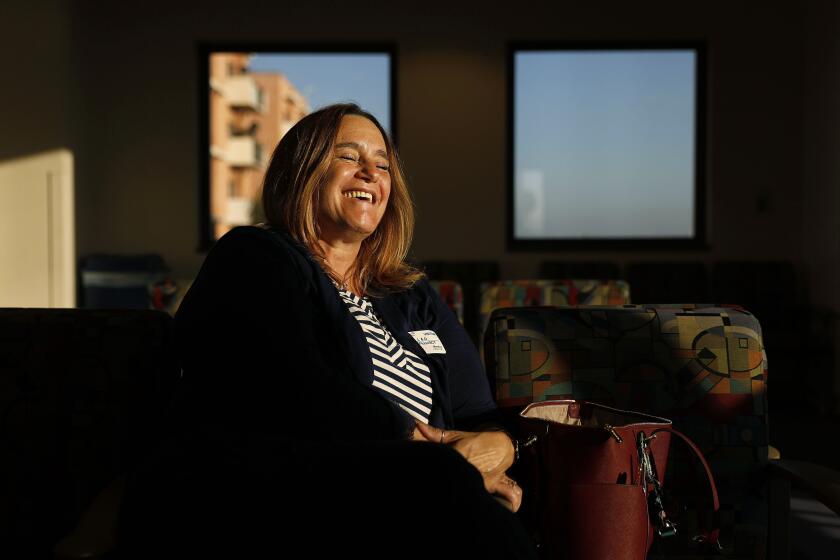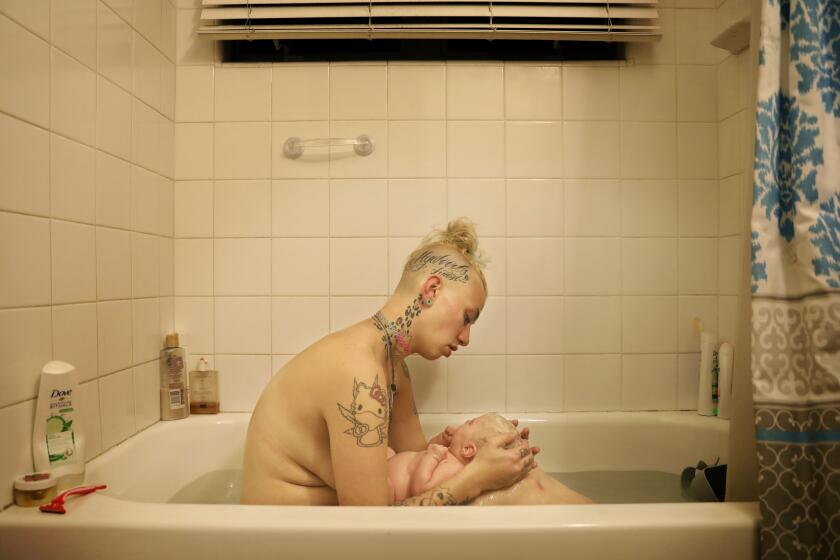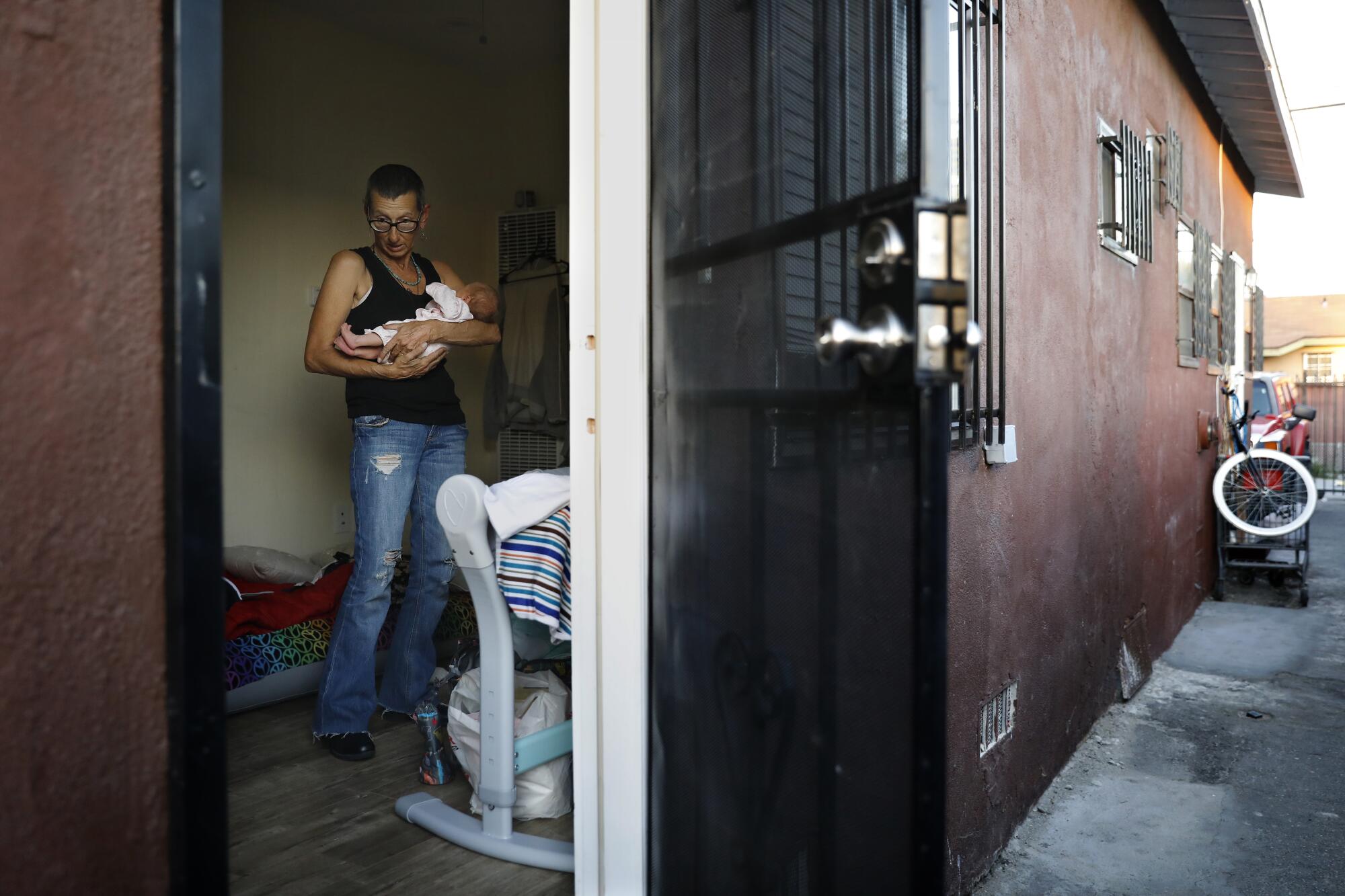
- Share via
When Mckenzie asked for her mother’s help during her pregnancy in 2018, Cynthia “Mama Cat” Trahan jumped on a train from a demonstration against police shootings in Missouri.
During Mckenzie’s troubled teen years, Cat, now 61, had remade herself as a social justice warrior, roaming the country from Portland, Ore., to Standing Rock, N.D., protesting pipelines and racism and skirmishing with white supremacists and police.
“You don’t get it. I’m the female Kerouac,” she said, a nod to the author of “On the Road.” “I have a beautiful life. ... It’s hard, though. My feet hurt.”
Cat’s vagabonding actually began during a fractured upbringing that presaged that of her daughter. The first of nine children born to a mentally unstable mother in Acadia Parish, La., Cat went into foster care at age 5.
As an adult, she struggled with poverty, and suffered mental and physical health issues, domestic violence and the loss of Mckenzie and a son to foster care.
”I have always been a nomad because I didn’t have a tribe,” Cat said.
Exceedingly fit with a buzz cut, dressed top-to-toe in anarchist black, she lived out of a backpack half her size, “stealth” camping in the desert or forests between political actions and trips to see her daughter and granddaughter. She befriends activists half her age who put her up at their homes or drive her to her next demonstration.
At times she’s lonely; her campsite has been a ditch. Cat’s history has left her better equipped to fight for justice writ large than to handle personal clashes, which trigger a fight-or-flight reaction; she receives disability payments for PTSD and medical conditions.
In an encampment above the Hollywood Freeway, nothing about Mckenzie Trahan’s future is certain.
Cat was not there for some of Mckenzie’s crises, including the removal of her children to foster care.
The worst stigma a woman could face is leaving a child. Men do it without suffering equivalent — or any — shame. Cat says she didn’t have the money or family backup to take over for her grandkids.
Out of anger or an attempt at tough love, Cat has fought ferociously with Mckenzie and they have come together and split apart many times. But always, they circle back to each other.
“You know, even though she’s mad at me, I’m still her best friend,” Cat said last year.
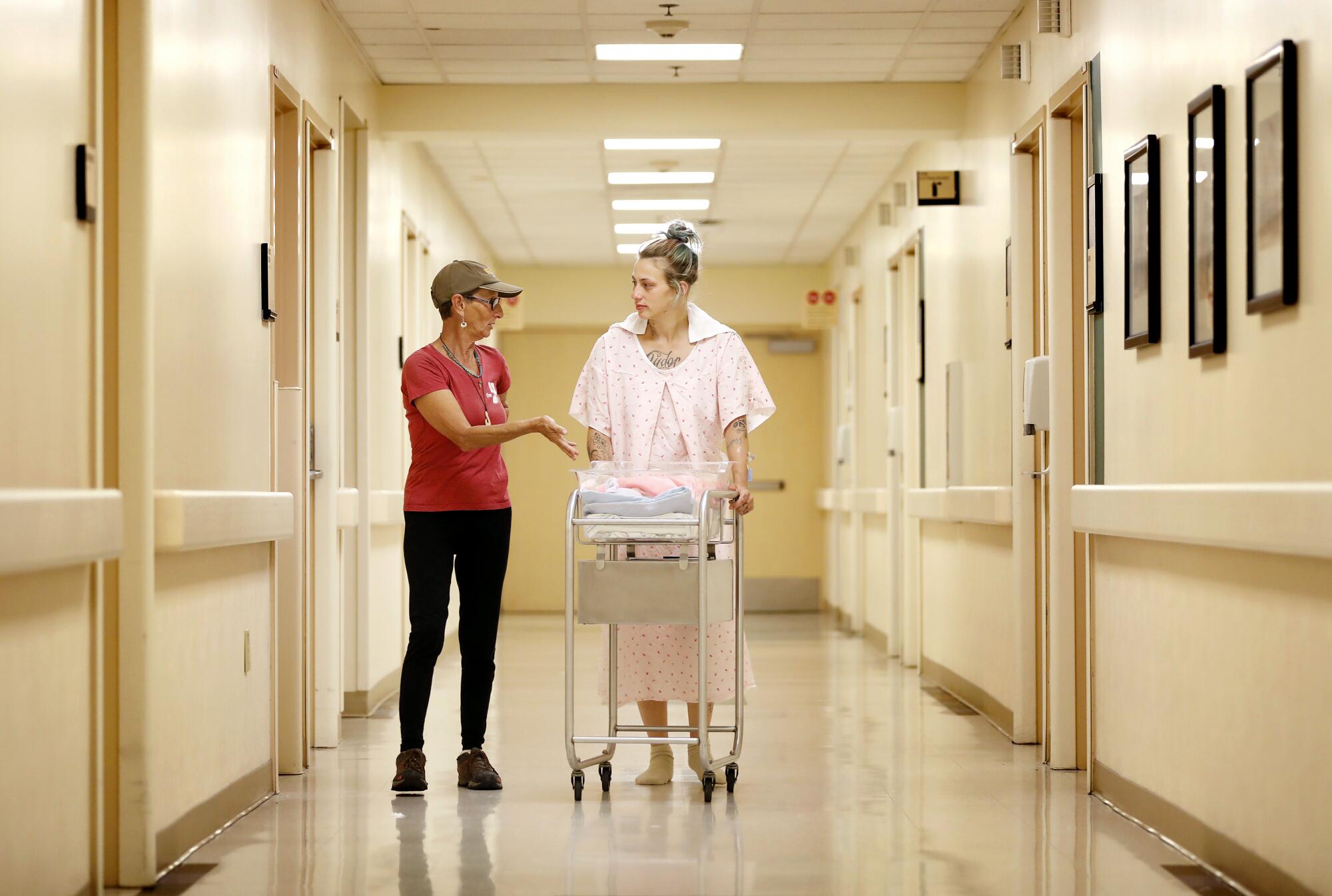
Circus dancer and a gambling ship
“I remember being in the white social services car in the back and looking up and seeing my mother and grandmother on the courthouse steps just sobbing,” Cat recalls. It was the late 1960s, and she had just been removed from her birth family and placed in foster care.
Her foster parents had a farm in Kinder, La., and taught her how to fish, hunt, can, sew and milk cows. “They were the best parents you could have,” Cat recalled.
Still, at age 13, she rebelled so she could go back to her birth mother. Instead she was sent to an abusive foster home in Ragley, La.
“Within six months of crazy there, they sent me to my mother, which was the craziest of all the places I ever lived,” Cat said. She described a home overflowing with kids and her mother’s boyfriends, who tried to molest her. She ran away to New York as a young teen, and spent time in the Louisiana Training Institute for Girls in Pineville before emancipating at age 18.
We met a world of young homeless people above the 101 Freeway in Hollywood, many who had grown up in foster care and the juvenile detention systems.
Her single days, by her account, were a fantastical odyssey: burlesque dancing in Taiwan, dealing cards in Las Vegas and aboard the Royal Princess Baltic cruise to St. Petersburg, Russia. She danced for the Suarez Brothers international holiday circus in Mexico.
“I ran away with the circus!” she said.
Some records of Cat’s life are confidential and her accounts are difficult to vet, but many details check out, including a photo of her Las Vegas gaming license and her London transit pass for the Baltic cruise. “I had big boobs and hips, blond hair down to my hips,” she said. “I was cute.”
Cat married in 1983 in Manatee County, Fla. While separated from her husband, she had a son with another man. Cat said she was undergoing hospital treatment when the boy, then 5, was placed in foster care and later adopted.
“I tried to fight for my son, but like [Mckenzie’s first two children] he was gone,” she said.
In 1993, Cat returned to Louisiana to clean up the bloody mess after her mother was shot and killed by her boyfriend in a murder-suicide.
Swimming with the manatees
Two years later, Mckenzie was born in Salt Lake City. The father, an Englishman, had another partner who was also pregnant. Cat was alone for the birth but thrilled to fulfill a lifelong desire for a daughter.
After a failed reunion with the father when Mckenzie was 5, Cat took her daughter on the road, sewing bikinis and skimpy costumes for strippers and queer folk. “It was a perfect job for a single work-at-home mother,” she said.
They fished, camped, swam and surfed, living a life of adventure, Cat said. She and Mckenzie speak fondly of a magical day swimming with the manatees off Florida’s Gulf Coast. When Hurricane Katrina hit, they fled New Orleans for Flagstaff, Ariz.
Mckenzie ran away in Nevada, and in February 2007, Cat moved them to Ventura to start over.
It didn’t go as planned. Mckenzie was molested by a friend’s stepfather. Cat and Mckenzie fought, and Cat put her daughter in a psychiatric facility, she thought for a weekend.
Mckenzie was placed in child protective custody, the start of “years of torture,” said Cat, who blames the molestation and foster care for her daughter’s wildness.
“She went nuts,” said Cat, “and then I went nuts.”
“Can you imagine not knowing if your daughter was dead in a ditch?”
Cat said she stood in front of Ventura County offices with a big pink sign that said “Schutzhaft” — German for “protective custody.” Nazis used the term to seize Jews and political prisoners for transport to concentration camps.
She chased her daughter to Hollywood, sleeping in party hostels such as Banana Bungalow or Moopad, or in tents with her daughter’s homeless friends, blanketing businesses on Hollywood Boulevard with missing person fliers.
Cat’s account of her hunt is alternately heartbreaking and slapstick.
“Can you imagine not knowing if your daughter was dead in a ditch?” she said in one breath.
In another: “I used to dress up in a wig and sunglasses, a long blond wig, and go hunt for my child. I was good. I could get 10 feet from her before she knew it was me.”
Activism and stealth camping
In 2011, Cat was in a motel room in Lake Tahoe when she discovered the Occupy movement on TV and launched her activist career.
After her arrival in Los Angeles for Mckenzie’s third pregnancy, Cat turned her militancy on some homeless service agencies and officials.
Many bureaucrats who have felt her wrath still shudder, but Cat’s confrontational tactics sometimes worked. On Mayor Eric Garcetti’s Facebook page, Cat posted a video of Mckenzie taking a sponge bath in a kiddie pool.
“This is the deal: We’ve got a pregnant young expectant mother taking this bath in a pool on the sidewalks of L.A.,” Cat narrated. “Hashtag — Eric Garcetti.”
The Rev. Andy Bales, who leads the Union Rescue Mission on skid row, said he saw the video and called City Hall and every outreach person he could find to get Mckenzie help.
After the baby’s birth, Cat “embedded” — her word — in an encampment in the shadow of Los Angeles City Hall. She argued with “Bible thumpers” and hounded mayoral aides about gardeners blowing leaves into the tents, among other grievances.
She accompanied Mckenzie and the baby on appointments, and FaceTimed with them daily, sometimes more, devising a clicking code that the baby recognized as “Nana” before she could speak. Mckenzie’s homeless case manager, Leslie Kerr, tried to help Cat find housing, but they fought and Cat rejected housing options, Kerr said.
“I’m not going to stay in a place with blue-haired ladies walking their poodles,” Cat said.
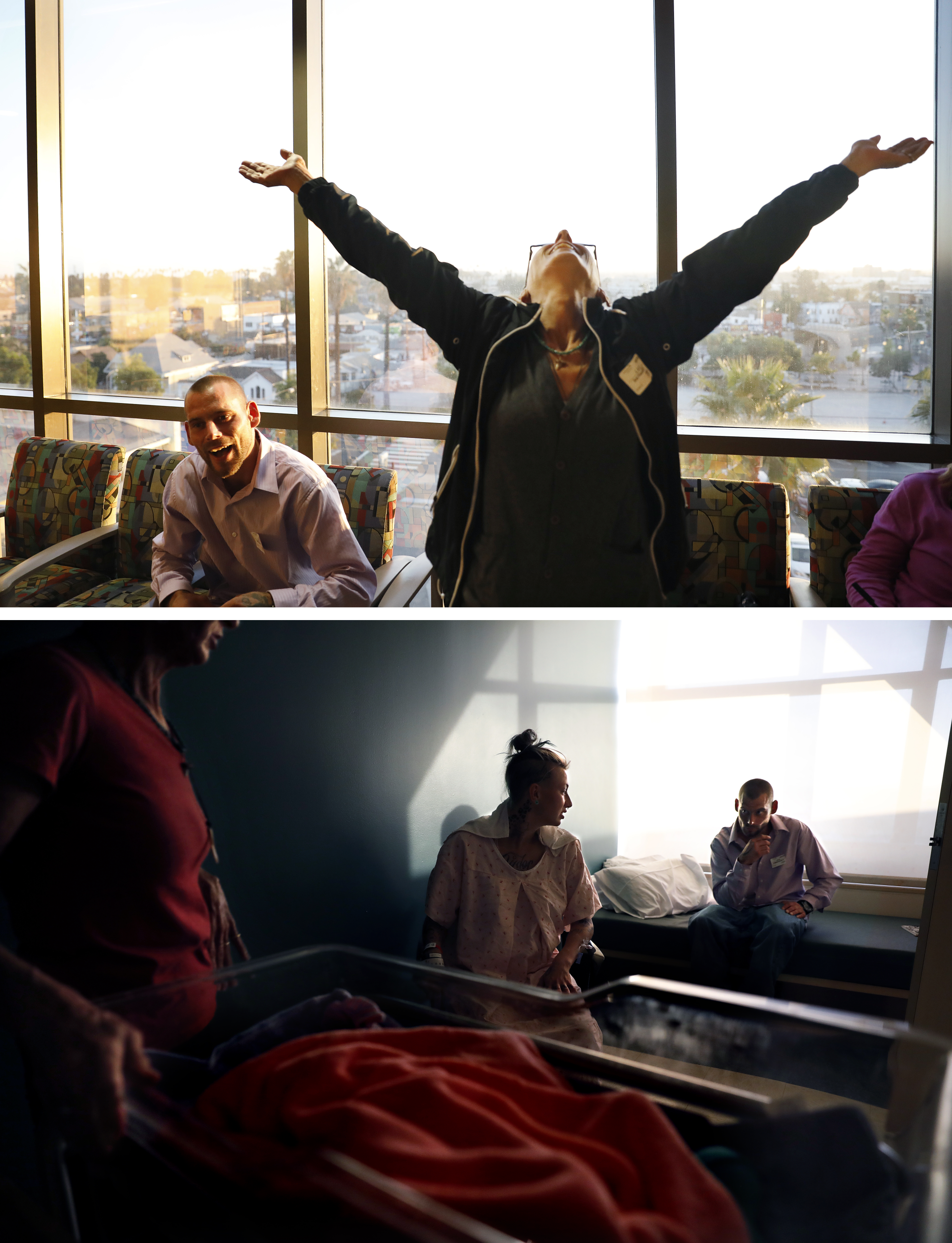
Soccer mom
On New Year’s Eve day 2018, Cat — dressed in a quilted ski suit against the chill — went for coffee with extra whipped cream at a Civic Center Starbucks to celebrate Mckenzie’s success in staying housed and off drugs. “We never got this far before,” she said.
“Mckenzie is going to be a PTA or soccer mom,” Cat joked. “She’ll have a minivan with doors open on both sides, and 18 kids.”
A month later, Cat had fled what she called “soul-sucking” Los Angeles. She returned in July and September, but the trips ended in big fights with Mckenzie. Cat said PATH, the homeless service provider, was failing her daughter.
“She needs budgeting. She needs parenting classes. She needs housekeeping skills,” Cat said. “She didn’t have her teenagerhood. ... She didn’t get the support she needed from them and she couldn’t get it from me. I don’t have a home or money to take care of her.”
“Everywhere I go I get treated with grand respect because I’m a traveler. I come to L.A. and I’m just a dirty homeless person.”
In October 2019, Cat awoke in the Alabama Hills west of Lone Pine, Mt. Whitney shining silvery in the new morning light over the salmon-colored boulder formations. “I think I figured out what it feels like to wake up in my small tent ... with the sun warming,” she said. “It’s like I’m in the womb. That’s why it feels so good.”
Picked up hitchhiking on her way to a marijuana dispensary in town, she told the driver she had been traveling for five years. He invited her to stay with him in Lake Tahoe.
“Everywhere I go I get treated with grand respect because I’m a traveler,” Cat said. “I come to L.A. and I’m just a dirty homeless person.”
That month, her grandchild, Ann, was placed in foster care.
Grandmothering and chocolate martinis
Cat talks to Ann regularly on FaceTime, and has been agitating the Department of Children and Family Services to make sure their relationship continues.
Earlier this year, Cat returned to Los Angeles seeking medical care and housing, and stayed variously in a tent in Hollywood, an L.A. bridge home and hotels converted for homeless people. She befriended liberal young homelessness advocates, who bought her a posh hotel room for her birthday in January and partied with her over chocolate martinis.
Cat believes nothing she could have done would have changed how things turned out for Mckenzie.
“I mean, a child should always be with his natural parent unless there’s something really bad going on at home,” she said. “I’m the one to tell you that because I had the things going on at home. But I still loved my mother.”
On the night in February 2007 when she and Mckenzie pulled into Ventura, Cat saw kids hanging out in the dark on the corner.
“And I’m like, ‘That’ll never be you,’ ” Cat said.
Mckenzie Trahan — or as her scalp tattoo put it, one of “Hollywood’s Finest” — was born into a family that for three generations had been buffeted by domestic violence, mental illness and homelessness, and caught up in child welfare cases. Times staffers Gale Holland, Christina House and Claire Hannah Collins met Mckenzie in 2018, and since then have documented the stories of Mckenzie and two other women — mother, Cat Trahan, and case manager, Leslie Kerr. Follow along on their journey.
More to Read
Sign up for Essential California
The most important California stories and recommendations in your inbox every morning.
You may occasionally receive promotional content from the Los Angeles Times.
